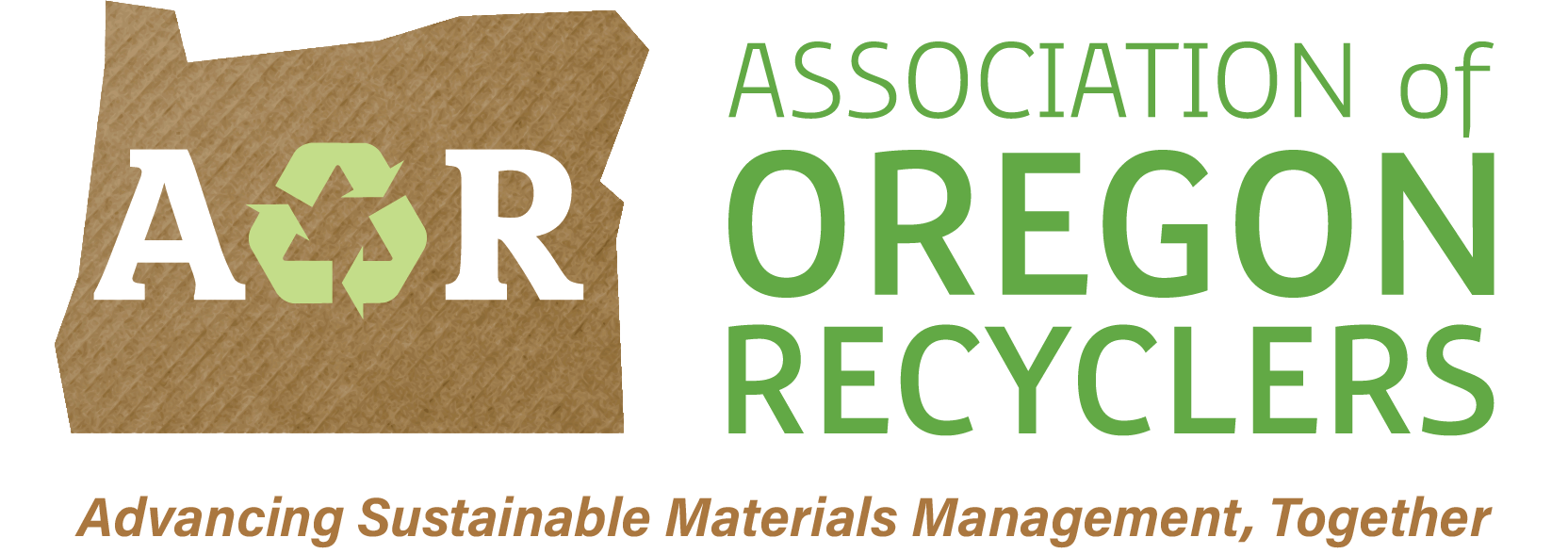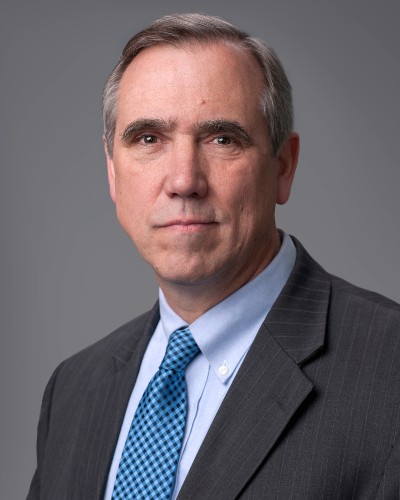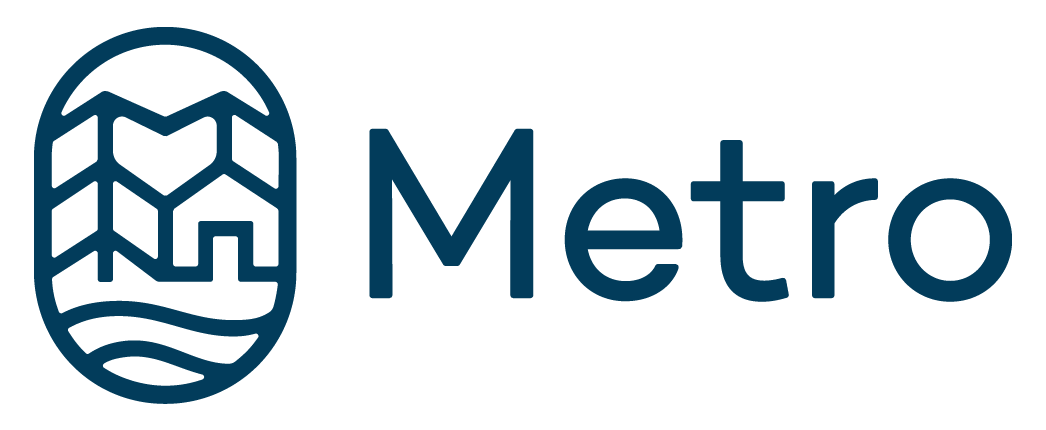 |
David Allaway | Oregon DEQ
David Allaway has worked at the intersection of waste, materials, and environment for over 30 years. He is currently a senior policy analyst at the Oregon Department of Environmental Quality (DEQ). After working extensively on recycling in the 1990s, David shifted focus to waste prevention and broader sustainable materials management, including the development of Oregon's 2050 Vision for Materials Management. He refocused on recycling in 2019 and 2020 as co-chair of Oregon’s Recycling Steering Committee. David recently served as an Advisor to Paul Hawken’s Project Drawdown and the New York Times bestseller Drawdown: The Most Comprehensive Plan Ever Proposed to Reverse Global Warming. He earned a B.A. in physics from Carleton College, Minnesota with a concentration in science, technology, and public policy.
|
 |
Bill Beamer | make x Concepts
Bill Beamer is a social entrepreneur and climate justice advocate. For more than 25 years, he has worked to foster healthy people, families, and communities. Bill approaches climate action from the perspective of people, particularly Black, Indigenous, and other communities of color. For that reason, he believes that the transition from fossil fuels to sustainable, clean energy sources must intentionally create economic growth for marginalized communities as well as eliminate carbon emissions.
Because of hemp’s sustainability, carbon sequestration, and soil remediation properties, Bill is a proponent of expanding industrial hemp markets. Industrial hemp can be used for building materials, textiles, paper, packaging, biofuel, and energy storage, to name a few, and development of these markets can create entrepreneurial and job opportunities in rural and urban communities.
|
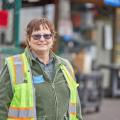 |
Kelly Bell | Lane County
Kelly Bell has been Lane County’s Master Recycler Coordinator since 2008. In addition to facilitating training classes and tours, fielding volunteer requests, and supporting the Plastics #2-4-5 Community Collector recycling project, Kelly manages reservations for Lane County’s Event Recycling Loan Program providing recycle bins and reusable dishware to residents and events free of charge.
|
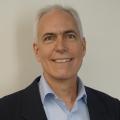 |
Bret Biggers | Institute of Scrap Recycling Industries
Bret Biggers is a senior economist at the Institute of Scrap Recycling Industries (ISRI). He collects, analyzes, and disseminates information on recyclable commodity trends. He is the staff liaison for the Paper Division, Plastics Division, and the MRF Committee. Other efforts Bret is working on includes the ISRI Specifications Circular, the Recyclability Protocol, Trade Committee, and Markets Access Working Group.
Bret has addressed economic, markets, and sustainability issues throughout much of his career, writing articles and producing reports. He has worked at the National Waste & Recycling Association, Flexible Packaging Association, and consulted in the trucking, chemical, and specialty printing industries.
|
 |
Elaine Blatt | Oregon DEQ
Elaine Blatt is a senior policy and program analyst at Oregon DEQ. Her primary focus is on sustainable consumption and production of materials, and she led development of DEQ’s strategy for preventing the wasting of food. She is currently leading market research designed to inform development of values-based messaging to encourage Oregonians to reduce wasted food, representing Oregon in a West Coast initiative to promote food waste reduction among grocers, and developing outreach on food waste prevention to food service businesses. Prior to joining DEQ, Elaine worked on a variety of projects related to sustainable production and consumption, energy efficiency, and supply chain management. She has a MA in Public Policy from the University of Chicago and a BA in Political Science from Carleton College.
|
 |
Ali Briggs-Ungerer | The Association of Plastic Recyclers
Ali Briggs-Ungerer is the Director of Market Development for The Association of Plastic Recyclers (APR). In this role she manages a handful of APR initiatives – including Demand Champions, PCR Certification, and the Market Development Committee – and supports APR communications. Ali started in the recycling industry in 2004 by sorting recyclables at a 90,000-person event and later moved into the electronics recycling and plastics recycling realms. Ali joined APR in 2017 and previously worked with Resource Recycling to produce the Plastics Recycling Conference, the E-Scrap Conference, and the Resource Recycling Conference. Ali is a longtime AOR board member and she resides in Portland, OR with her family.
|
 |
Caitlin Buchanan | U.S. Senator Jeff Merkley
Caitlin Buchanan (she/her) is Senator Merkley’s Policy Advisor for environment, transportation and infrastructure, and agriculture. As part of her environment portfolio, Caitlin advises Senator Merkley on issues related to plastic pollution, recycling, and chemicals. Prior to joining Senator Merkley’s DC office, Caitlin advocated for robust federal environmental justice policies, and was a staff member for the U.S. House of Representatives Committee on Science, Space, and Technology.
|
 |
Peter Canepa | Oregon DEQ
Peter Canepa joined the Oregon Department of Environmental Quality in January 2017, providing Life Cycle Assessment (LCA) expertise to Oregon’s Materials Management Program. Peter’s primary role is to conduct and support projects that advance Oregon towards achieving its 2050 Vision through the application of LCA. Prior to this role, Peter spent eight years with Thinkstep, a consultancy specializing in LCA. Peter holds a Master’s degree in Environmental Science and Management and a Bachelor's degree in Environmental Studies.
|
 |
Elaine Cole | Portland Community College
Elaine Cole, PhD is the Sustainability Coordinator at Portland Community College’s Rock Creek Campus and is responsible for the overall coordination of sustainability practices and programs. Some of these include energy conservation, campus-wide composting, recycling and waste reduction, and training and event planning for faculty, staff, and students. Elaine has taught environmental education from the shores of Jekyll Island, Georgia to Lake Tanganyika in Burundi. She has always had a deep commitment to population education and her 2017 TEDX talk was titled Creating Eco-Friendly Families.
|
 |
Nancy Dong | Golden Bungalows
Nancy Dong is the designer/builder of ADUs (accessory dwelling unit) for Golden Bungalows, Inc. serving the Portland metro area and SW Washington. She is passionate about the intersection of aging in place, sustainable building, and affordable housing, and continually strives to bring them ever closer together in the design of ADUs for her clients. Hempcrete is of particular interest due to its regenerative ability, healthy earth-friendly nature, and its timeliness for the building industry right now. Nancy serves on the Clark County Commission on Aging, is a member of Clark County Housing Options Study and Action Plan, is a member of the US Hemp Building Association, and is a Certified Aging Specialist.
|
 |
Kate Eagles | The Association of Plastic Recyclers
Kate Eagles serves as Program Director for the Association of Plastic Recyclers (APR), the international trade association representing the plastics recycling industry.
Kate’s APR focus areas include the management of the APR Materials Recovery Facility (MRF) Committee; analysis related to California legislative and regulatory topics; furthering the success of PET thermoform recycling; identifying and educating regarding PET package design features that adversely impact recycled material supply and quality; and data analysis pertaining to recycled materials collection, processing, and markets.
Kate joined the plastics recycling industry in 2005 and wore various hats during her 10-year tenure at the California-based plastics recycling consultancy Moore Recycling Associates. During this time, Kate served in several roles for the National Association for PET Container Resources (NAPCOR), with specific focus on projects and analyses related to the recycled PET supply chain, the domestic PET reclamation industry, and recycled PET end markets.
Before making the move to plastics recycling, Kate worked in a variety of food and beverage marketing and public relations roles. She lives and works in northern California.
|
 |
Stacey Foreman | City of Portland
Stacey Foreman manages the City of Portland’s Sustainable Procurement Program, driving change for more sustainable products and services through public contracting. Stacey is active in a variety of regional and national efforts to build sustainable procurement resources, and has served on related advisory committees and boards for the Sustainable Purchasing Leadership Council, the Sweatfree Purchasing Consortium, and the Green Electronics Council’s EPEAT program. Stacey is a LEED Accredited Professional and has presented to national and international audiences on the topic of sustainability in public procurement.
|
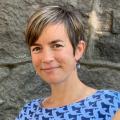 |
Cheryl Grabham | Oregon DEQ
Cheryl Grabham is a program manager at the Oregon Department of Environmental Quality (DEQ)’s headquarters in Portland. She supervises the solid waste and material recovery teams who develop and implement policies and programs such as the Plastic Pollution and Recycling Modernization Act, the Drug Takeback Program, Oregon E-Cycles, sustainable procurement, Life Cycle Analysis, measurement, and much more.
Cheryl has worked at DEQ since 2008, including spending several years as the liaison to the governor’s Regional Solutions Team for the Portland Metropolitan area, and working on innovative projects in DEQ’s Water Quality and Materials Management programs. She helped develop DEQ’s 2050 Vision for Sustainable Materials Management and oversaw the nation’s first paint product stewardship program. She holds a Bachelors degree in Environmental Science from the Colorado College and a Masters of Environmental Science degree from Alaska Pacific University.
|
 |
Rosalynn Greene | Metro
Rosalynn has been working in this field for 17 years and is very passionate about her focus on research, program evaluation, and data collection. Her career began as an employee at DEQ where she administered the statewide 2004 Recycling Composition Study. After completing the project, Rosalynn was hired by Clackamas County’s Office of Sustainability to coordinate and track outcomes for waste reduction outreach programs. In September 2013 she joined Metro as a Senior Waste Reduction Planner where her current focus is developing indicators and a measurement strategy for the 2030 Regional Waste Plan.
|
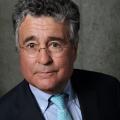 |
Patrick Grasso | Pozzotive
Patrick Grasso is a senior partner at Urban Mining Industries. Patrick and his partners are producing Pozzotive®, a sustainable building material derived from post-consumer waste glass. Used as a cement replacement, Pozzotive can reduce the carbon footprint of concrete by up to 40% while providing a large-scale solution to the ongoing challenges that waste glass creates in our recycling stream. Patrick is responsible for ongoing strategic planning, national site selection, capital market efforts, and the coordination of major relationships within the glass recycling industry, developer community, and various government agencies.
Patrick’s past and present professional affiliations and other memberships include the Glass Recycling Coalition, the Glass Recycling Foundation (founding and current board member), Northeast Recycling Coalition (glass recycling committee), ULI, PREA, and the NYU Center for Hospitality (founding board member). He has served as a member of the Board of Trustees for The Stanwich School and Chair of Stewardship for St. Catherine’s in Riverside, CT. He earned his MBA from the Wharton School and his B.E. (Civil Engineering) from Manhattan College.
|
 |
Bryce Hesterman | RRS
|
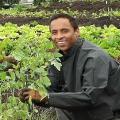 |
Edward "Eddie" Hill | Black Food Sovereignty Coalition/Culinary Collaboratory/Black Farm Bureau
Edward “Eddie” Hill is currently serving as Co-Director at the Black Food Sovereignty Coalition and Community Food Systems Navigator for Black Farm Bureau, both located in the Pacific Northwest, working between Oregon and Washington State.
Eddie’s directness and sincerity brings energy into his collaborative work advancing environmental and social justice through food systems, climate impact management, and economic development in vulnerable, historically marginalized, and undercapitalized communities. The merging of QBL, sustainable and regional food systems, and innovation combined with increased use of community-based shared/circular economic models is providing opportunities for BIPOC producers, operators, and researchers to equitably build the food system that will begin to heal our lands.
Starting as a small farm organic farmer in Olympia, WA, Hill quickly honed his interests in addressing disparities and inequity in urban spaces to more upstream issues around food systems for People of Color. While in his graduate program, Hill participated in the King County Communities Putting Prevention to Work – Healthy Foods Here project, served as a delegate for the W.K. Kellogg Foundation Food & Fitness-funded King County Food & Fitness Initiative (KCFFI), co-led the Delridge Healthy Corner Store Project, and launched USDA-funded farmer training programs leveraging Seattle-owned farmable lands for BIPOC and African immigrant/refugee populations. Eddie has served as a city planner for Portland’s Bureau of Transportation, served in the US Army, was Executive Director of Groundwork Portland, and an adjunct professor at both Antioch University Seattle and National University of Natural Medicine in Portland teaching community food systems.
Hill attended California State University Hayward for mass communications and ethnic studies, Art Institute of Seattle for graphic design, The Evergreen State College, Tacoma in urban studies, and completed his coursework at the University of Washington’s College of Built Environment.
|
 |
Latrice Holloway | People's Depot
|
 |
Jill Hrycyk | Metro
Jill Hrycyk (pronounced her-ritz-ik) has been working in behavior change transformation for 14+ years in various industries including energy efficiency, travel and tourism, healthcare, and solid waste and recycling. As a project planner and manager, she believes the key to successful implementation is through thoughtful research and diverse stakeholder collaboration with empathy and humility.
|
 |
Amanda Ingmire | Oregon DEQ
Amanda is a registered architect and policy analyst in the Materials Management Program at the Oregon Department of Environmental Quality. Her work centers on addressing the impacts and burdens of the built environment at the intersection of climate, health, equity, and racial justice. Amanda is Research and Advocacy Co-Chair for the International Living Future Institute (ILFI) Portland Collaborative, member of the NAACP Environmental Justice Committee and Centering Equity in the Sustainable Building Sector initiative, and volunteer for Your Street Your Voice. Prior to joining DEQ, Amanda was a project architect and sustainability leader at Gensler and Ankrom Moisan Architects. Amanda holds a Master’s of Architecture from the University of Oregon and a Bachelor’s of Environmental Design from the University of Colorado.
|
 |
David Ives | Waste Connections
David is a videographer and photographer based in the Portland Metro area. He graduated from Southern Oregon University with a degree in communication, emphasis in video production. From there he moved to Santa Cruz, CA where he learned digital cinema systems and further honed the technical side of his craft. David worked in the Bay Area for several years doing a variety of video work for startups and other clients. Upon returning to the Pacific Northwest, he has pursued storytelling media and found great solace and meaning in nature photography.
|
 |
Meg Johnson | Waste Connections
Meg Johnson is the Construction & Demolition and Recycling Events Coordinator for Waste Connections of WA. She puts together educational events and videos for Clark County residents, facilitates LEED and other sustainable building projects, and is part of the Clark County Master Composter Recycling education team. Meg started at Waste Connections of WA on the customer service team in 2017 and moved to the recycling team for her current role in 2019. Meg is an avid gardener, loves French and Italian cinema, and is a Trekkie.
|
 |
Tom Lang | Oregon DEQ
Tom has been with Oregon DEQ since the spring of 2019. As a materials management regional specialist, he works with local governments along the north coast and within the Metro region to meet the requirements of the Opportunity to Recycle Act, implement waste prevention programs, and provide planning resources to community leaders and local organizations. Tom also administers grants within the Northwest Region, and supports research on behalf of DEQ's 2050 Vision of Materials Management. Prior to joining DEQ, Tom worked and researched for the National Park Service and U.S. Forest Service through the Rocky Mountains and Alaska.
|
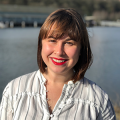 |
Sam Lake | City of Tacoma
Sam leads the City of Tacoma’s Commercial Recycling and Waste Prevention outreach programs. In 2018, she launched Tacoma’s Multi-Family Recycling Education Program – bringing continuous improvement, equity, and community-based marketing principles to the forefront of her work. Currently, she is spearheading Tacoma’s first transcreation efforts to improve language access among non-English speaking residents. Sam, a Tacoma native, earned her Bachelors’ in Political Science from Seattle University and enjoys working directly with her community. In her spare time, she assists volunteers and coordinates litter cleanups and serves on the ReTacoma Reuse Store board.
|
 |
Michael Lee | Oregon DEQ
Michael is the program coordinator at the Oregon Department of Environmental Quality (DEQ) for the Drug Take-Back Program. Overseen by DEQ’s Materials Management Program, the Drug Take-Back Program is a statewide product stewardship program offering Oregon residents a convenient, safe, and secure way to dispose of unwanted prescription and over-the-counter medicines. Michael joined DEQ in 2018.
|
 |
Erik Makinson | Resource Synergy
Erik Makinson has built a career on helping organizations realize financial and environmental value through sustainability programs. While working for The Coca-Cola Company, he led the development of the food service industry's first compostable cold cup, helped proliferate recycling cooperatives from Brazil to Mexico and Argentina, and redeployed energy-efficient refrigeration from the Beijing Olympics to Walmart stores in China. Subsequently, he spent six years building a waste consulting business for Ecova, which today supports over 100 clients representing 60,000 business sites. Since founding Resource Synergy in 2015, Erik has helped over 150 Northwest businesses reduce cost and improve their environmental impact through waste reduction, recycling, and composting programs. He has spoken at conferences or has written articles for numerous organizations including the National Restaurant Association, US Chamber of Commerce Foundation, GreenBiz, Environmental Leader, and the California Resource Recovery Association. He holds a BA in Business Administration/ Marketing from Seattle University, a Certificate of Sustainable Business from Pinchot University, Resource Recovery Manager Certification from the California Resource Recovery Association, and Certified Energy Manager (CEM) designation from the American Association of Energy Engineers.
|
 |
Carolina Martins
Originally from Brazil, Carolina moved to Oregon four years ago. She is proudly the first-generation college student in her family. She is passionate about environmental justice and plastic waste reduction. Carolina organized several beach clean-ups and campaigns to reduce plastic pollution when she was a college student at Portland Community College. She is a certified Master Recycler, and she has experience working with initiatives and programs to promote sustainable practices. For the last two years, Carolina has been working with data analysis and collection to measure progress in sustainability. Carolina also volunteers her time with workgroups that support sustainability and equity work in the Pacific Northwest. Outside of work, she enjoys finding new hikes and going on scenic drives.
|
 |
Angie Marzano | Lane County Waste Management
As Waste Reduction Specialist at Lane County – Waste Management Division, Angie oversees stakeholder engagement, contracts, and state recycling rules and regulations. Before coming to the County, Angie helped clients implement strategies that reduced energy use, managed carbon emissions, and improved business operations. She is also co-owner of Hot Mama’s LLC., a local restaurant in Eugene, Oregon. Angie holds a BA in Political Science and Business Administration from the University of Oregon. She currently serves as Secretary for the Association of Oregon Recyclers, where the Board advocated for the passage of SB 582 - Plastic Pollution and Recycling Modernization Act. Angie brings over 16 years of environmental sustainability experience to the County. She is an avid runner, skier, hiker, and enjoys anything outdoors. A Northeast Oregon native who grew up mushroom hunting, river rafting, and camping, she attributes these early memories and teachings to her love of the environment and her desire to protect it.
|
 |
Minal Mistry | Oregon DEQ
Minal Mistry is the business initiatives lead with the Oregon Department of Environmental Quality. He supports concept development, research, and capacity-building activities and strategies that advance Oregon’s 2050 Vision for Materials Management. He is currently focused on pathways that could enhance well-being in the material life cycle. He has worked with global brands on implementing Design for Environment (DfE) strategies for consumer-packaged goods. Minal is a biologist with experience in business, nonprofit, and government.
|
 |
Deveron Musgrave | City of Eugene
Currently a Waste Prevention Analyst for the City of Eugene, Deveron previously worked in the nonprofit sector in sustainability and reuse. She is the City’s Repair and Reuse program lead, and has a role in the Sustainable Events program, the Love Food Not Waste program, Partners in Education program, the City’s Internal Zero Waste program, and worked to develop the City’s Water Station Project, which provides water bottle refilling stations for events. She regularly presents on sustainable event topics at conferences and events and has previously served as a Whilamut Citizen Planning Committee member and vice-chair and as a past board member of the Eugene Springfield ToolBox Project.
|
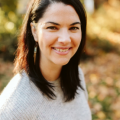 |
Athena Petty | New Seasons Market
Athena Petty is the Senior Manager of Sustainability for New Seasons Market, a chain of neighborhood markets with a focus on local products and partnerships. New Seasons was the world's first B Corp-certified grocery store and strives to be the ultimate neighborhood grocery store by giving back to its staff, community, and the environment. Athena works to integrate sustainability principles into all areas of business, from reporting systems and communication to waste and emissions reduction and operations and procurement. She believes that in order to solve the most pressing issues of our time, we must shift the way we work to focus on ways to make a positive impact on the environment and our communities. Athena brings 15 years of experience in sustainability and efficiency from her roles at Pacific Natural Foods and Energy Trust of Oregon and lives in Portland with her partner, young daughter, and two energetic cats.
|
 |
Eadaoin Quinn | EFS-plastics
Eadaoin Quinn has been working in the recycling industry for nearly a decade. She spent the first seven years working at MRFs – Sims in NYC and Canada Fibers in Toronto – and she has been working with plastic reclaimer EFS-plastics for three years. She is the Director of Business Development and Procurement at EFS, where they recycle #3-7 and film plastic collected through municipal recycling programs. She has undergraduate and graduate degrees in biology from McGill University and University of Toronto, and she is currently pursuing a part-time MBA degree at York University in Toronto.
|
 |
Alex Reyna | La E-Kiss
I’ve been a member of this community since 1994. I’m an emigrant from Mexico who moved to this community as a teenager seeking the opportunity to learn a new language and to learn about the United States way of life.
I came to this country with a tourist visa and my plans were to live here for six months and learn as much as I could. But life circumstances forced me to overstay my visa and I became undocumented. After my visa expired I lived as an undocumented immigrant for over 10 years while I waited for the approval of my permanent residency.
To live as an undocumented immigrant during those years made me realize there was lack of community resources and support for those whose first language is Spanish. To me, not being able to understand any process that allows an individual to assimilate and become a part of the community they live in explained the reason why immigrants were not present in any civic gathering, politics, school events, community resource disbursements, health fairs, etc. It felt like living in the shadows. This experience became my inspiration to become an advocate for equal opportunities and rights for everyone and gave birth to the La E-Kiss project.
|
 |
Sanne Stienstra | Oregon DEQ
Sanne Stienstra (she/her) is a natural resource specialist with Oregon DEQ’s Materials Management Program where she currently works as the project manager for the Plastic Pollution and Recycling Modernization Act. She has worked on a range of topics including multifamily recycling, food waste prevention, and diversity, equity, and inclusion. She enjoys working in sustainable materials management because of the potential to transform how society thinks about our consumption habits and what it means to “live well.” Prior to joining DEQ in 2018, Sanne was the Green Business Coordinator for Washington County Solid Waste & Recycling. She has a Master of Public Administration from the University of Washington Evans School of Public Policy and Governance. During quarantine, Sanne started reading nonfiction and learned how to knit.
|
 |
Tiana Lightfoot Svendsen | U.S. Plastics Pact
For more than a decade, Tiana created and managed recycling programs and environmental outreach campaigns for academic, medical, and government organizations. Throughout her career she has propelled cross-functional teams to reach their goals and balance the triple bottom line. Tiana brings her boundless passion for sustainability and a multifaceted approach to communication to the U.S. Plastics Pact’s team.
Why I Care About Recycling and a Circular Economy
“There is no Planet B. At least not one with pizza and chocolate. I am honored to work with diverse stakeholders and partners to find solutions which improve recycling and lengthen and close the loop on materials to ensure a healthy and prosperous future for generations to come.”
Personal Passions and Interests
When she is not helping advance a circular economy for plastics, Tiana and her family can be found on litter clean-up walks around the lake or having impromptu dance parties in their living room.
Highlights
- LEED AP: BD+C & O+M
- Certified Practitioner of Zero Waste Practices and Principles
- B.A. & M.A. from Southern Methodist University
|
 |
Taylor Cass Talbot | WIEGO/Groundscore
Taylor works for WIEGO: Women in Informal Employment Globalizing and Organizing, where she coordinates their global Reducing Waste in Coastal Cities project. The project supports the organizing of waste picker associations in ways that maximize marine waste reduction. She has worked at the confluence of waste reduction, labor, and social inclusion for more than a decade, as both a project manager and an artist.
Taylor spent four years developing a zero waste program for the Samdrup Jongkhar Initiative, in SE Bhutan. She also worked for the SWaCH waste picker cooperative in Pune, India, developing their “Red Dot Campaign” to improve sanitary waste management. Taylor began working with waste pickers in 2008 as part of Live Debris, a series of international workshops and art exhibits that she designed to draw attention to social inclusion in the waste sector.
She has a background in environmental studies and a Master’s in Peace and Conflict Resolution. Taylor is currently based in Oregon, USA, where she also works part-time for the organization Trash for Peace, supporting the formation of a new waste picker association there called Ground Score. In her free time, she herself picks waste for art and crafts projects.
|
 |
Asami Tanimoto | The Recycling Partnership
Asami brings more than a decade of experience managing, analyzing, and solving environmental and sustainability problems. She has a broad background in air quality, water, energy, waste, remediation, and green buildings and infrastructure. As a consultant, she worked with a wide variety of clients including municipalities, federal and state agencies, businesses, institutions, and industrial facilities. In all her work, Asami combines her technical expertise as a chemical engineer with her deep experience in community engagement. Asami is especially passionate about connecting individuals and organizations so they can share and collaborate. As a Community Program Manager at The Recycling Partnership, she oversees grants to communities and provides technical assistance, with a keen eye toward bringing partners together to enhance local efforts.
|
